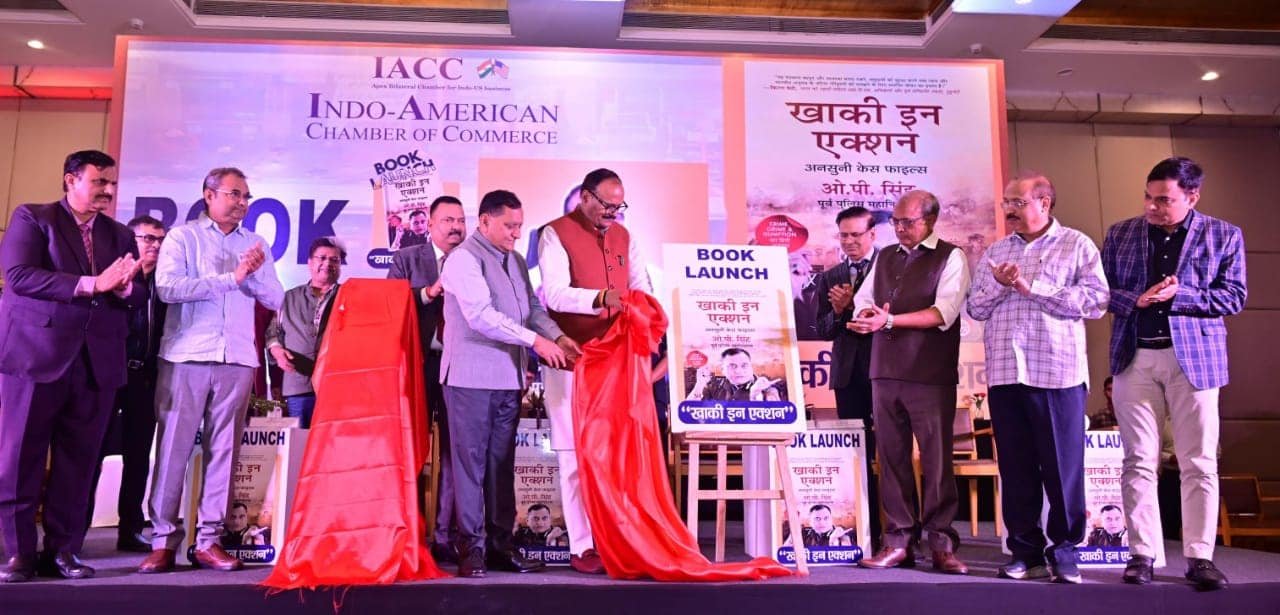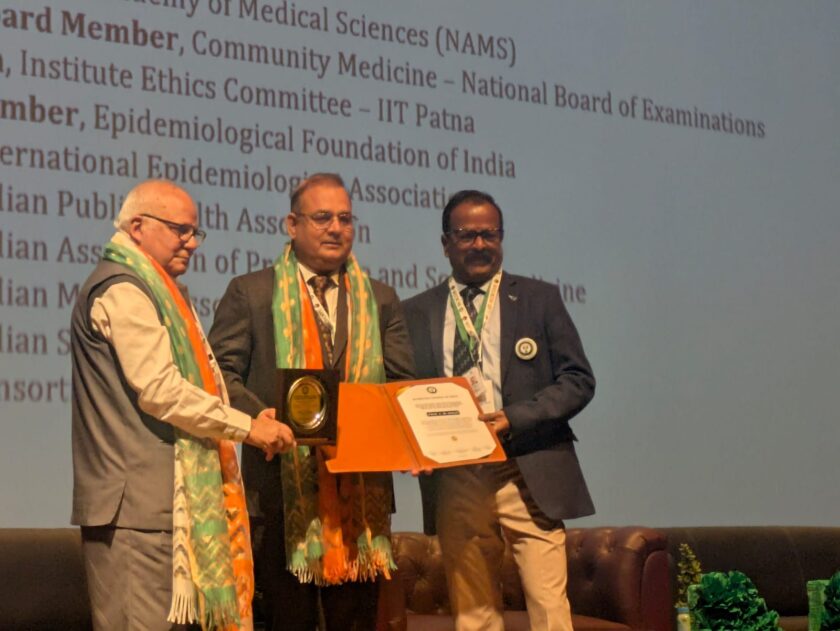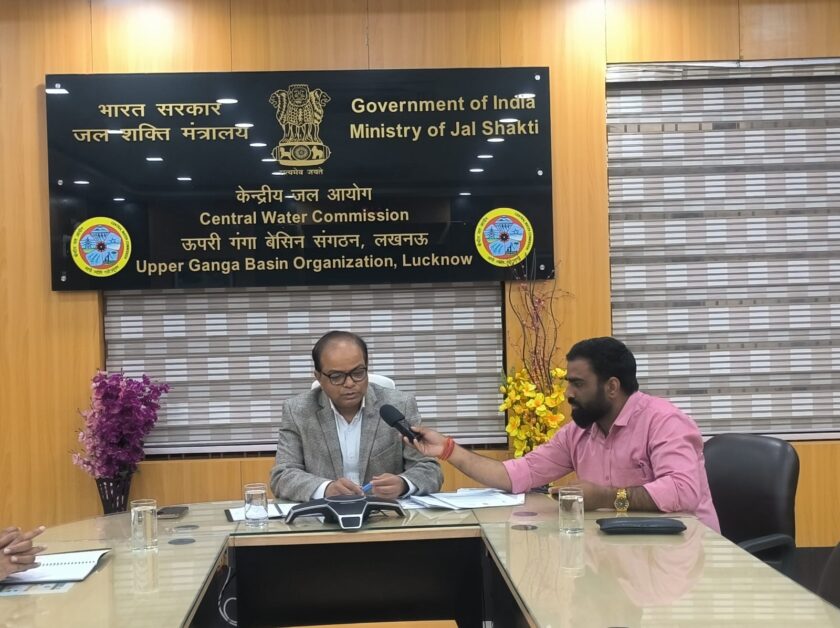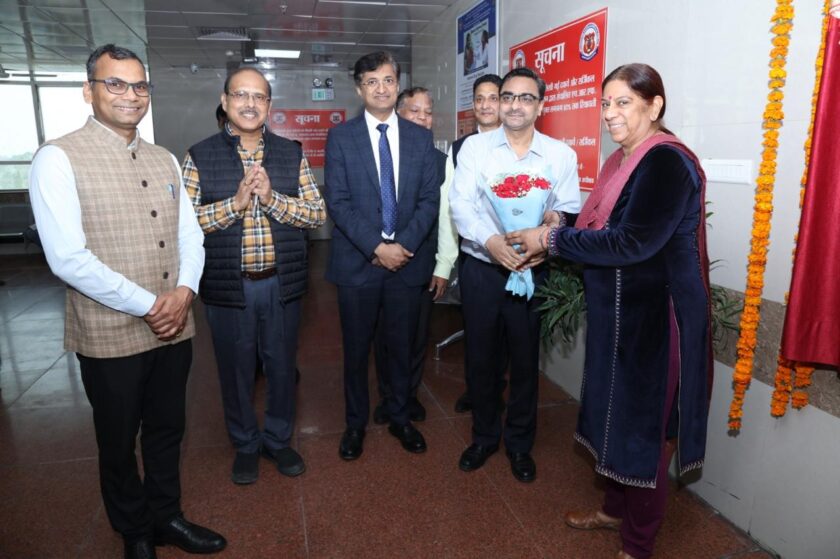Lucknow: The book launch of Khaaki in Action by former DGP OP Singh was a significant event organized by the Indo-American Chamber of Commerce (IACC) in Lucknow, with Deputy Chief Minister Brajesh Pathak as the chief guest. The event brought together key figures from the law enforcement and bureaucratic sectors, highlighting the book’s importance in understanding the complexities of internal security in India.
During the launch, Brajesh Pathak praised OP Singh’s memoir, noting its insightful portrayal of the challenges faced by law enforcement officers, especially in tackling crime and maintaining order. He emphasized that the book would serve as an invaluable source of inspiration for readers, offering a deeper understanding of India’s policing mechanisms and the resilience required to address the country’s security challenges.
The book itself chronicles OP Singh’s 37 years of distinguished service in the police force. It delves into his remarkable contributions in various capacities, from his tenure in Lakhimpur Kheri, where he effectively countered Sikh militancy through a blend of counterterrorism strategies, community engagement, and teamwork, to his work with the Central Industrial Security Force (CISF), Uttar Pradesh Police, and the National Disaster Response Force (NDRF). Singh’s memoir highlights innovative policing strategies and leadership in diverse and challenging environments.
The formal book launch was a grand affair, attended by a mix of serving and retired officers. Among the notable figures present were Mukesh Singh, the Chairperson of IACC, who welcomed the guests, and Sujit Pandey IPS, Binod Singh IPS, P.V. Ramashastri IPS, S.N. Sabat IPS, Prakash D IPS, and many others from the serving police cadre. Prominent retired officers also attended, including J.K. Shahi, R.K. Chaturvedi, A.P. Maheshwari, Arun Sinha, Brijesh Kumar, and Alok Ranjan.
The event not only marked the launch of a book but also underscored the collective appreciation for OP Singh’s contributions to India’s policing, reinforcing the crucial role of law enforcement in maintaining national security. The occasion served as a reminder of the tireless work done by officers across the country and the importance of sharing these experiences to inspire future generations of law enforcement professionals.
“Khaaki in Action” is an inspiring account penned by OP Singh, the former Director General of Police (DGP) of Uttar Pradesh, which takes the reader through his illustrious career in law enforcement. The book offers a rare and firsthand insight into the world of policing, law and order, and the challenges faced by those who dedicate their lives to ensuring the safety and security of the public. Singh, who has held a prominent position in India’s law enforcement hierarchy, provides readers with a gripping narrative about the intricacies of policing in one of the most populous and diverse states in India.
Overview of the Book: The book is a memoir of sorts, where DGP OP Singh recounts his years of service, highlighting pivotal moments, key challenges, and his own reflections on law enforcement. Drawing from his vast experience across various roles, Singh shares his personal experiences from both a tactical and emotional perspective. His journey is marked by encounters with crime syndicates, political pressures, and the strategic balancing act between maintaining law and order while addressing the ever-evolving socio-political environment.

The Writing Style: The writing style of OP Singh is simple yet powerful. He succeeds in capturing the essence of real-life challenges faced by a police officer in today’s India. His tone is candid and often reflective, which helps the reader connect with the emotions and struggles of someone who is part of a system that is not only challenging but also highly scrutinized. The book is not overly technical or bogged down by jargon, making it accessible to a wide audience, including those unfamiliar with law enforcement procedures. The book is filled with real-life examples, anecdotes, and reflections, which bring to life the complexities of policing.
Key Themes:
- Policing in Uttar Pradesh: As the DGP of Uttar Pradesh, one of the most lawless states in India, Singh’s leadership is central to the book. He provides an in-depth look at the unique challenges of managing the police force in a state with over 200 million people, diverse cultures, and complex crime dynamics. The book delves into the challenges of tackling communal violence, lawlessness in rural areas, and political influence on police operations.
- Reforms and Strategies: Singh discusses the reforms he initiated and the strategies he employed to modernize policing in Uttar Pradesh. This includes the introduction of advanced technological tools for crime detection, the recruitment of more women officers, and efforts to make the police force more citizen-friendly. The book emphasizes the importance of improving the relationship between the police and the public, showcasing initiatives like community policing and modern training programs.
- Dealing with Crime Syndicates: One of the most riveting sections of the book deals with Singh’s experiences in dealing with the state’s notorious crime syndicates. Uttar Pradesh has been a breeding ground for gangsters, and Singh sheds light on how he, along with his team, took down some of the most powerful criminal networks in the state. His account provides readers with a detailed look at how intelligence gathering, coordinated operations, and fearless leadership helped disrupt these crime operations.
- The Role of Police in a Politically Charged Environment: Politics and policing have always had a complex relationship in India, and Uttar Pradesh, with its political volatility, is no exception. Singh provides an honest look at the political pressures faced by police officers in the state, particularly during crucial elections and in handling sensitive cases. He offers insight into how police neutrality is often tested and how one must maintain professional integrity despite political interference.
- Personal Reflections on Leadership: Beyond the professional challenges, Singh reflects on his personal growth as a leader. He shares insights on how he managed crises, motivated his team, and built a culture of accountability within the police force. The book is as much about leadership as it is about policing, and Singh’s reflections on leadership are both valuable and inspirational.
- Women in Policing: An important aspect of the book is Singh’s focus on the growing role of women in the police force. He discusses the increasing recruitment of women officers and the challenges they face in a traditionally male-dominated profession. Singh also emphasizes the need for creating a safe and supportive environment for women within the police force.
Impact of the Book: “Khaaki in Action” is not just a memoir, but a call to action for police officers and citizens alike. It provides valuable lessons on how law enforcement can adapt to meet modern-day challenges. Singh’s insights are crucial for anyone looking to understand the dynamics of law enforcement in India, especially in states like Uttar Pradesh. The book highlights the importance of integrity, strategy, and reform in making the police force more efficient and responsive to public needs.
Strengths:
- Authenticity and Insight: As someone who has been at the top of the law enforcement hierarchy, Singh’s account is authentic and filled with unique insights that only someone in his position could provide. The book offers readers a rare behind-the-scenes look at the police force and the decision-making process involved in managing one of India’s largest police forces.
- Engaging Narratives: The book is filled with gripping stories and anecdotes that keep the reader engaged. Singh’s writing makes even technical discussions about policing intriguing, as he brings personal experiences and emotions into play.
- Inspiring Leadership Lessons: The book is an excellent resource for those in leadership positions, particularly in high-pressure environments. Singh’s approach to handling crises, motivating a team, and navigating political complexities is an invaluable takeaway for anyone in a leadership role.
Weaknesses:
- Limited Focus on Broader Policymaking: While the book provides an excellent personal narrative, it could have expanded more on the larger policy decisions and national strategies in policing. A deeper dive into the systemic challenges and reforms needed at the national level could have added more value to the discourse.
- Occasional Generalization: While Singh’s personal reflections are valuable, at times, the book tends to generalize the challenges faced in the police force without going into the specifics of policy implementation. More detail on the impact of specific reforms would have been insightful.
“Khaaki in Action” by DGP OP Singh is an honest, riveting, and reflective account of one of the most challenging careers in India—policing. The book is an inspiring read for anyone interested in law enforcement, public administration, and leadership. It sheds light on the immense responsibilities borne by those in the police force and provides a blueprint for how one can lead with integrity and effectiveness in challenging circumstances. While focused on Singh’s tenure in Uttar Pradesh, the lessons shared in the book are universal and relevant for police forces across India.









